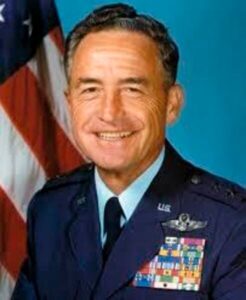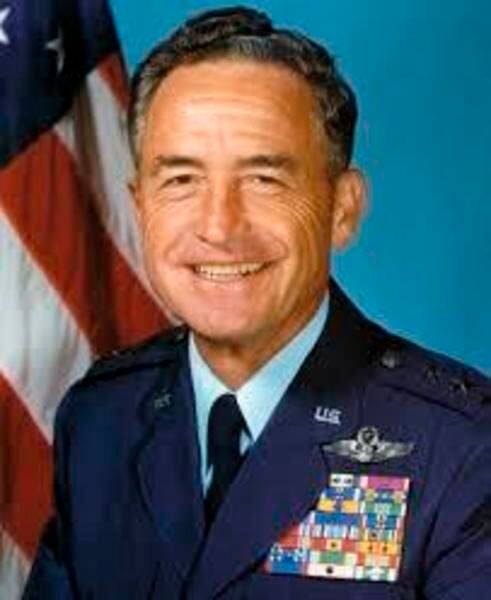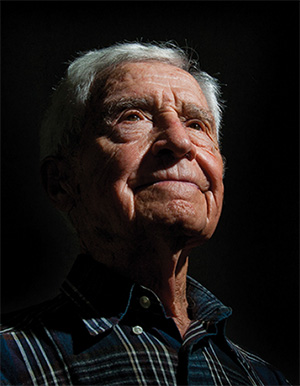“LeRoy Joseph Manor died at his home in Shalimar, Florida, on February 25, 2021. Almost precisely one-hundred years before, on February 21, 1921, he was born in another home, a farmhouse on the French Settlement Road in Beekmantown, New York, to Walter and Delia, the second of five children: Harold, Lois, Dorothy, and Lawrence; Lawrence survives him.
On occasion and over time, Roy had expressed, in the self-effacing way that perpetually had the undercurrent of a subtle but effervescent humor that formed his character, that he would like to reach the age of 100. He did that on February 21. Like every endeavor throughout his life, it was well accomplished.
The ethics of community, compassion, service and duty began in the North Country and informed his life, first as a child and young man on his parents’ farm, through college, as a teacher in a one-room schoolhouse in the community where he was raised, during his 36-year Air Force career, and continuing until his death. In that schoolhouse, Roy taught multiple grades, his students including siblings and children from his small community, the lessons often imparted while he cooked their lunches on a wood-burning stove. He traveled the world as an Air Force officer and fighter pilot. On June 6, 1944, at the stick of a P-47 Thunderbolt, he flew top cover for the Normandy invasion, a leather-helmeted pilot, a twenty-three year old participant in a great historical event, a farm boy now as equally skilled in combat aviation as on a three-legged milking stool in his father’s dairy parlor. Through the subsequent years and miles, he never forgot his roots or compromised his principles.
Roy received his pilot wings and was commissioned a second lieutenant in the United States Army Air Corps in August 1943. He retired from the Air Force as Chief of Staff of the United States Pacific Forces on July 1, 1978 at the rank of lieutenant general. In the interim, he served in assignments throughout the country and the world. He flew 322 combat missions: 47 in Europe during WWII in P-47s and 275 in Vietnam in F-100 Super Sabres, where he commanded the 37th Tactical Fighter Wing at Phu Cat Air Base. Roy carried the scars of battle throughout his life: fragments of artillery in an arm and leg from a burst of flak high above France. Throughout the plaudits of career and rank, he was, first and always, a fighter pilot. It was his passion and his calling.” (1)
Source: (1) https://www.mclaughlinmortuary.com/tributes/Leroy-Manor
Leroy “Roy” J. Manor, LtGen USAF, Ret., “Headed West” on February 25, 2021.
 Lt. General Leroy J. Manor
Lt. General Leroy J. Manor
1921 – 2021
Roy Manor was born on February 21, 1921, in Morrisonville, New York. He enlisted in the U.S. Army Reserve on June 8, 1942, and entered the Aviation Cadet Program of the U.S. Army Air Forces on November 19, 1942. Manor was commissioned a 2d Lt and awarded his pilot wings at Spence Field, Georgia, on August 30, 1943, and after completing P-47 Thunderbolt training, he was assigned to the 365th Fighter Squadron of the 358th Fighter Group in Europe from December 1943 to September 1945.
His next assignment was with the Air Proving Grounds at Eglin Field, Florida, followed by an Air Force Institute of Technology assignment to complete his bachelor’s degree at New York University. Capt Manor completed Instructor Pilot School in May 1947, and then served with the Tactical Air School at Tyndall AFB, Florida, the Squadron Officer School at Maxwell AFB, Alabama, and at the Air-Ground Operations School in Southern Pines, North Carolina. He was an operations staff officer with the 6th Allied Tactical Air Force at Izmir, Turkey, from September 1953 to August 1955, and then commanded the 2242nd Air Reserve Flying Center at Selfridge AFB, Michigan, from August 1955 to July 1958.
Col Manor attended Armed Forces Staff College from July 1958 to January 1959, and then commanded the 481st Tactical Fighter Squadron of the 27th Tactical Fighter Wing at Cannon AFB, New Mexico, from January 1959 to July 1960. He served as Chief of the Tactical Evaluation Division with Headquarters U.S. Air Forces in Europe at Lindsey AS, West Germany, from July 1960 to June 1963, and then attended the Industrial College of the Armed Forces from August 1963 to May 1964.
Col Manor next served with Headquarters U.S. Air Force in the Pentagon from June 1964 to March 1968, followed by service as commander of the 37th Tactical Fighter Wing at Phu Cat AB in the Republic of Vietnam from May 1968 to May 1969. During this time Col Manor flew 275 combat missions in the F-100 Super Sabre. His next assignment was as commander of the 835th Air Division at McConnell AFB, Kansas, from June 1969 to February 1970, followed by service as commander of the U.S. Air Force Special Operations Force at Eglin AFB, Florida, from February 1970 to February 1971.
During this time, Gen Manor also commanded Operation Ivory Coast, the Son Tay Raid to rescue American Prisoners of War at the Son Tay POW Camp in North Vietnam, on November 21, 1970. He was special assistant for counterinsurgency and special activities on the staff of the Joint Chiefs of Staff at the Pentagon from February 1971 to February 1973, and then served as Vice Commander and then Commander of 13th Air Force at Clark AB in the Philippines from February 1973 to October 1976. Gen Manor’s final assignment was as Chief of Staff of U.S. Pacific Command at Camp Smith, Hawaii, where he served from October 1976 until his retirement from the Air Force on June 1, 1978.
Gen Manor wears Command Pilot Wings and accumulated over 6,500 flying hours during his Air Force Career, as well as flying 347 combat missions in two wars.
His 1st (of 4) Air Force Distinguished Service Medal Citation reads:
The President of the United States of America, authorized by Act of Congress July 9, 1918, awards the Distinguished Service Medal to Brigadier General Leroy J. Manor for exceptionally meritorious service to the United States in a duty of great responsibility. General Manor distinguished himself as the Commander of a Joint United States Task Force from 8 August 1970 to 21 November 1970. During this period, General Manor commanded the humanitarian force whose mission was to search for and rescue United States military personnel held as Prisoners of War deep within the territory of North Vietnam. He conceived a brilliant tactical plan and carefully selected and helped train the volunteers with the necessary expertise to carry out the mission. Over a period of three months, he repeatedly simulated each phase of the operation, thereby insuring its faultless execution. General Manor’s brilliant talents of command and supervision resulted in a superbly trained Joint Task Force. The mission was daring in concept and bold in execution. General Manor directed the operation from his command post with the highest degree of professionalism. Despite the great hazards involved, the operation was conducted without the loss of a single American life. The singularly distinctive accomplishments of General Manor reflect the highest credit upon himself and the United States Air Force.
















